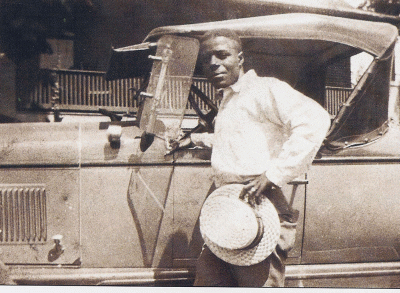Adventures in Cross-Note
|
Sometimes referred to as Open D minor or Open E minor tuning, Cross-Note is most
famously associated with Skip James, who played some of his best-known material in this tuning.
Skip referred to the tuning as cross-note, with the rather cryptic explanation being that, in the tuning,
"the major crosses the minor". If you tune to Open D minor, the strings are pitched DADFAD.
For open E minor, EBEGBE. The intervals of the open strings are the same as an E minor chord in
standard tuning in which you fret the fifth and fourth strings at the second fret, I-V-I-flatIII-V-I.
6th string=Root |
|
The tuning is most often used to play in the key of the sixth string: D if you are in open D minor,
or E if you are in open E minor. Because the top three strings are the same intervals that they
are in standard tuning, you can play any of the phrases you play in E standard on the top 3 strings
using the very same fingering. An advantage of cross-note over standard tuning is that in cross-note
you have an octave alternating bass of open strings between the sixth and fourth strings; in E standard
you have to fret the fourth string at the second fret to get the octave alternating bass.
|
Arthur Crudup
That's All Right, Mama
Mean Old Frisco
If I Get Lucky
Coal Black Mare
Booker White
Aberdeen Mississippi Blues
Bukka's Jitterbug Swing
Parchman Farm Blues
Sic 'Em Dogs
Special Streamline
Cornelius Bright
Devil Got My Woman
My Baby's Gone
Fred McDowell
Jim Steam Killed Lula
Funny Papa Smith
Whiskeyhead Blues
Hayes McMullan
Sugar
Henry Townsend
Doctor, oh Doctor
Henry's Worry Blues
Jack of Diamonds/Georgia Rub
Mistreated Blues
Poor Man Blues
She's Got A Mean Disposition
Jack Owens
Can't See, Baby
Cherry Ball
Good Morning, Little Schoolgirl
It Must have Been the Devil
Nothin' But Notes
Hard Times
Robert Wilkins
Nashville Stonewall Blues
Skip James
4 O'Clock Blues
Broke and Hungry Blues
Cherry Ball Blues
Cypress Grove
Devil Got My Woman
Good Road Camp Blues
Hard Luck Child
Hard Time Killin' Floor Blues
Illinois Blues
Jesus Is a Mighty Good Leader
Sickbed Blues
Washington D.C. Hospital Center Blues
Yola My Blues Away
Teddy Darby
Lawdy Lawdy Worried Blues
Lincoln Jackson
Loping Blues
From The George Mitchell Collection, Volumes 1 - 45
| 3-03 | Bud White | White Horses | Cross-note | Eflat+ | 1969, 02/02 | Richland GA |
| 5-27 | Rosa Lee Hill | Count the Days I'm Gone | Cross-note | Bflat+ | 1967, 08/23 | Como MS |
| 5-28 | Rosa Lee Hill | Roll & Tumble | Cross-note | C#+ | 1967, 08/23 | Como MS |
| 5-29 | Rosa Lee Hill | Bullying Well | Cross-note | E | 1967, 08/23 | Como MS |
| 7-15 | Eddie Hodge | Blood Red River | Cross-note | Eflat- | (unknown) | (unknown) |
Have a song to add to the list?
Go to original forum thread
